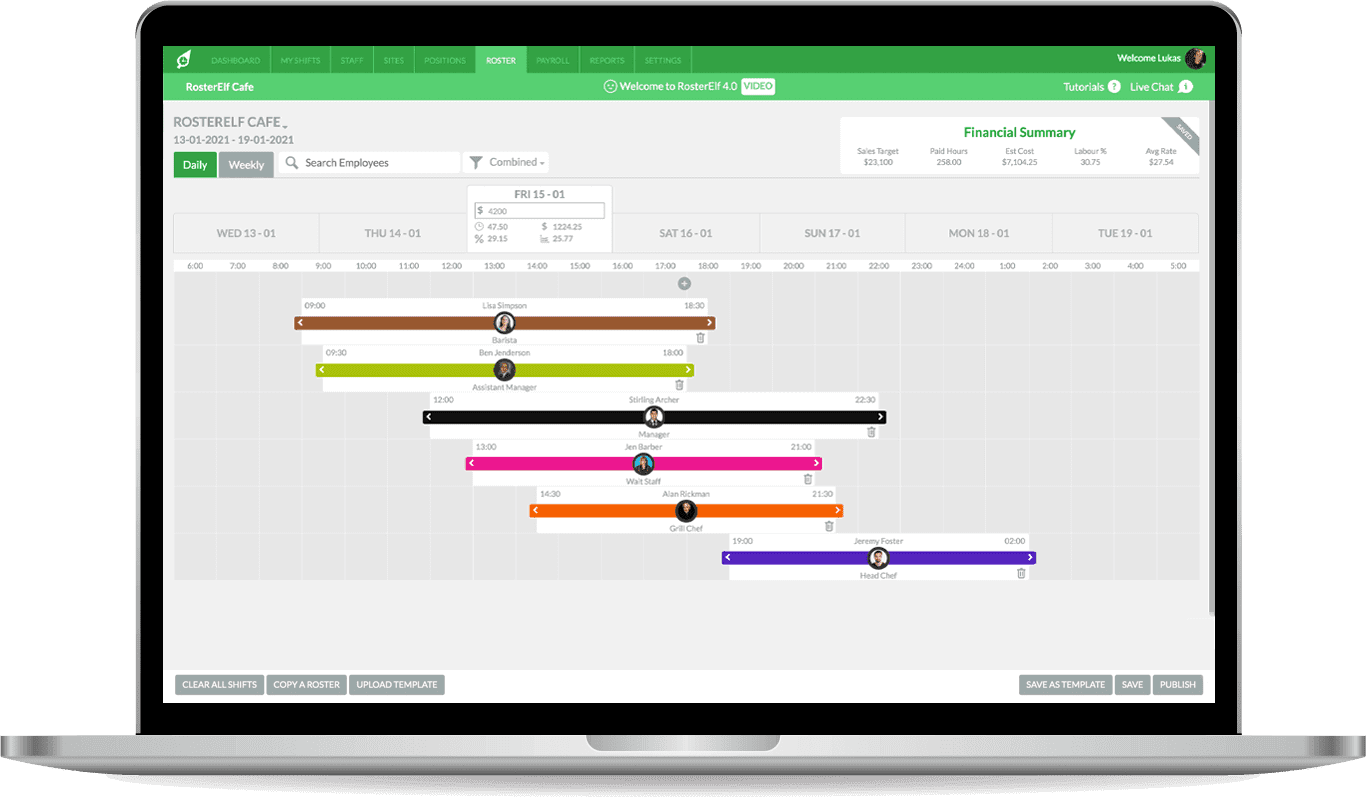What are the different types of schedules?
Work schedules make every business operation systematic and coherent, especially with a large workforce. It is a list of time cycles an employee is expected to work and is often regulated by the employer.
However, with different schedule types available and each having its pros and cons, it can be challenging to choose. Therefore, identifying the most convenient work schedule for your organisation is vital. As a result, your employees will achieve a better work-life balance while ensuring the entire workforce is productive.
Understanding every scheduling type can help you decide which framework works best for your business and, most of all, your team.
1. Rotating type
A rotating schedule is often applicable to a workforce with shift work. For example, employees work the first shift for the first week, the second shift for the second week, and the third shift for the third week. You also have the option to rotate shifts every day.
The drawback of having this type of scheduling structure is that your employees' work-life balance may suffer due to irregular work hours.
This type may be necessary for certain professions such as firefighters, nurses, and police officers. However, this may cause more problems for other industries than it tries to resolve.
2. Compressed type
A compressed schedule is one where your employees work the same amount of hours on some days compared to the usual "9-5" structure. For example, an employee works 7 am to 5 pm from Monday to Thursday.
A compressed schedule makes planning and forecasting labour costs easier because it gives fixed work hours. Your employees will also have a better work-life balance as they will have an extra week off to attend to personal matters.
3. On-call type
The on-call schedule is where employees are available to work at any time as per the employer's demand. This schedule usually rotates between employees, so everyone has their fair share of work.
Most, if not all, employers implement on-call schedule types to prepare for "no call, no show" employees and to plan for possible emergencies.
4. Split type
A split type is when an employee's work schedule is divided into two or more periods during the day and is separated by several hours for a break or lunch. For instance, an employee works from 7 am to 9 am, takes off, and then returns to work from 2 pm to 5 pm.
This schedule type can be problematic for employees. For some, this allows them to run errands like picking up kids from school or other matters, but they also have to deal with separate commutes. In addition, it can put excessive stress on your employees, making split shifts less desirable.

5. Flexible type
With flexible hours or no set schedule, employees have tasks to complete but don't have specific hours they must work. For example, your employee can take the rest of the week off if they can complete their task in less than a 40-hour work week.
Likewise, employees can work early in the morning or late at night. This type is similar to freelance work because employees decide when to work. The only difference is that your employee must report to your office to do the workload.
This schedule can motivate employees to finish work early within the week to enjoy the extra day off. However, given that this schedule involves so much freedom, it takes a focused and strong-willed employee to pull this off.
This work schedule can provide employees with the work-life balance they need, eventually leading to a happier and more satisfied team. The drawback is that tracking the work done and guaranteeing you're getting your money's worth can be challenging.
6. Overtime type
As the name suggests, employees work more than the regular full-time hours per week. Therefore, compared to hours fewer than 40, wages for overtime work schedules are often higher. You may need to implement this schedule during big projects or peak seasons. However, employers tend to avoid overtime because it gets costly fast.
Occasionally, you will ask some employees to work extra overtime to reduce labour costs while covering the working hours.
Manage all schedule types with RosterElf
Indeed, there are many schedule types to choose from, but which is which? The best way to answer this question and, at the same time, stay organised and productive is by investing in the best employee scheduling app like RosterElf.
RosterElf makes your staff scheduling highly efficient, thanks to its flexibility and cloud-based features. What took you hours to finish now takes only a matter of minutes. What makes RosterElf stand out are thanks to:
- Range of iOS and Android apps
- Fully cloud-based scheduling app
- Digital time and attendance
- Employees can submit availability and time-offs
- Accurate award interpretation
- Third-party integrations systems such as MYOB, Xero, WageEasy, and Sage

RosterElf's employee scheduling software provides business owners like you with a simplified yet dynamic rostering solution. Our live schedule costings ensure you are up-to-date with your roster's actual cost before publishing it. That way, you can optimise profitability while ensuring enough shift coverage during busy times.
RosterElf's employee rostering and payroll software makes scheduling easy as pie. Simply add shifts, set start and finish times, and then let the app run and automatically suggest the most suitable employees based on availability and skill set.
You can re-use or copy previous roster templates to make your scheduling process faster and more seamless. What's more? You can re-publish rosters from the comfort of your mobile phone or tablet. In addition, the push notification feature sends your new and updated schedule to employees.
What are you waiting for? Time to take your rostering and payroll game to the next level and boost your business' performance.
To get a clearer view of how our app works, enjoy 15-day access to our tool for free: 15-day free access to RosterElf



